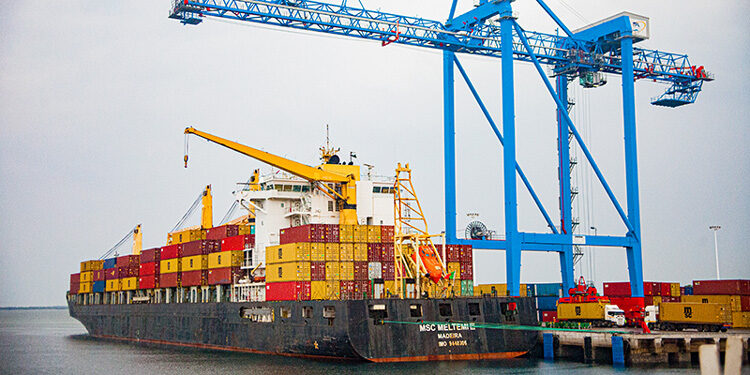In its bid to enhance its competitive edge in the East Africa region, Dar es Salaam Port has brought on board another global port operator to run four berths to improve capacity and efficiency. In July 2024, Tanzania granted a 30-year concession to Adani International Ports Holdings Pte Ltd (AIPH) to operate and manage the Second Container Terminal at the port of Dar es Salaam.
The agreement between the global operator and the Tanzania Ports Authority (TPA) will see the new entrant run berths eight to 11, which have an annual cargo handling capacity of one million TEU but managed 0.82 million Twenty-Foot Equivalent Units (TEUs) in 2023 with the four berths handling 83 percent Tanzania’s total container volumes.
The Indian-based Adani joins Dubai state-owned DP World in positioning Dar as a strategic player in the region, which hosts several other ports that include Mombasa and Djibouti, two of the region’s biggest ports. Port Berbera, which is ranked above the two other ports by the World Bank, is operated by DP World. Dar es Salaam Port has an annual capacity of 14.1 million tonnes for dry cargo and six million for bulk liquid cargo.
In December last year, TPA completed the dredging of the entrance channel and turning basin to the berths, meaning the port enhanced its capacity to handle vessels with a draft of 13.5 meters. The new entrant is expected to invest in increasing the depth of berths 8–11 as part of the concession conditions. Currently, only 12 vessels or less can dock at a time, which creates challenges, especially during the high season.
AIPH is a wholly owned subsidiary of Adani Ports and Special Economic Zone Ltd. East Africa Gateway Limited (EAGL) was incorporated as a joint venture of AIPH, AD Ports Group, and East Harbour Terminals Limited (EHTL). APSEZ will be the controlling shareholder and will consolidate EAGL on its books. EAGL signed a Share Purchase Agreement for the acquisition of 95% stake in Tanzania International Container Terminal Services Limited (TICTS) from Hutchison Port Holdings Limited (and its affiliate Hutchison Port Investments Limited) and Harbours Investment Limited for a purchase consideration of USD 39.5 million. TICTS currently owns all the port handling equipment and employs the manpower. Adani will operate CT2 through TICTS.
“The signing of the concession for Container Terminal 2 at Dar es Salaam Port is in line with APSEZ’s ambition of becoming one of the largest port operators globally by 2030. We are confident that with our expertise and network in ports and logistics, we will be able to enhance trade volumes and economic cooperation between our ports and East Africa. We will strive to transform Dar es Salaam Port into a world-class port,” said Mr. Karan Adani, Managing Director, APSEZ.
Dar es Salaam becomes the first container terminal to be operated by Adani in the African continent, a region in which the conglomerate is targeting to increase its footprint. Last year, in line with Tanzania’s strategic development plans and is a testament to the visionary leadership of H.E. Samia Suluhu Hassan Dar port invited Dubai-based DP World to manage its berths.
“The development will deliver trade opportunities for the region, connecting East Africa and broader sub-Saharan Africa with global markets, driving economic growth, job creation, enhanced access to products and services, and creating value for all our stakeholders. Alongside other ports that we operate, this concession agreement marks another milestone in our collective efforts to leverage DP World’s global and local expertise to enhance the region’s supply chain to support the economic growth of the entire continent,” Sultan Ahmed bin Sulayem, DP World Group Chairman, and CEO said.
DP World signed a 30-year concession agreement with the Tanzania Ports Authority (TPA) to operate and modernize the multi-purpose Dar es Salaam Port, connecting Tanzania and the wider region to global markets.
The concession to operate and modernize the Dar es Salaam Port was awarded to DP World with the primary objective of optimizing the Port’s operations to improve transport and logistics services throughout Tanzania and its hinterland. This is the first phase of a multi-phase investment plan. DP World will initially invest more than $250 million to upgrade the port and the investment could increase to $1 billion during the concession period, alongside hinterland logistics projects. This investment will have a positive impact on Tanzania’s socio-economic development, in terms of job creation and increased access to products and services, among other benefits.
The port will connect to the hinterland of sub-Saharan Africa through a network of roads, highways, railways, and dedicated freight corridors and ports, supporting the growing demand for logistics solutions across the continent and connecting businesses in the region to global markets.
The port has greatly benefitted from recent investments made by the Government of Tanzania to improve its infrastructure. DP World is working with the TPA alongside the port’s existing stakeholders to build on this progress to allow for faster cargo clearing and improved cargo planning – strengthening Dar es Salaam’s critical role as the maritime gateway for green energy metals from the copper belt in Southern-Central Africa. Improved efficiency will attract more shipping lines and bigger ships into Dar es Salaam, which will ultimately lead to lower ocean freight costs for Tanzanian importers and exporters.
DP World will make future investments in modernizing the Port, including potential investments in temperature-controlled storage to enhance Tanzania’s agricultural sector, as well as greater connections to rail-linked logistics. Investments will also potentially include the future development of a special economic zone together with the broader Port’s logistics sector, which will increase Tanzania’s role and influence on the future of global trade. DP World continues to make significant investments to realize its Africa strategy and growth ambitions, which aim to boost economic growth and uplift local communities and businesses by enabling trade and connecting markets to the global trade ecosystem.
This article was published by the editorial team at FEAFFA. For any enquiries, contact us via Email: editorial@feaffa.com/ freightlogistics@feaffa.com / onionga@feaffa.com Tel: +254733780240





